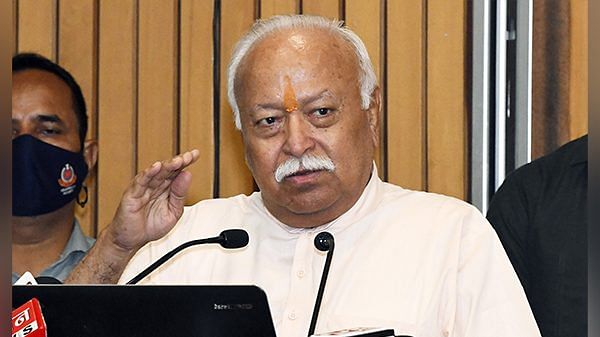Rashtriya Swayamsevak Sangh chief Mohan Bhagwat’s meeting with Muslim leaders has been claimed to be a reachout to the community. But its main message is one that the RSS has been trying to put forward for years – the “de-Arabisation” of Indian Islam.
This is not the first time that an RSS chief has held meeting with leaders of the Muslim community. RSS’ second Sarsanghchalak, M.S. Golwalkar, had met Muslim leaders in 1961. In his talks with Saifuddin Jeelani, an Arabic scholar, he outlined the views of the RSS on Hindu-Muslim issues, reforms needed and also on the question of Indianisation.
Subsequent top leaders of the 97-year-old organisation have held frequent meetings with representatives of Muslims and Christians alike. The meeting between Bhagwat and five eminent Muslim leaders last month was in continuation of this practice wherein it was agreed to hold such periodic interactions.
Also read: Month after meeting Muslim intellectuals, Bhagwat makes 1st mosque visit, meets imam body chief
Partition and the divide
The Hindu-Muslim divide has its genesis in the tragic Partition and in the events leading up to Independence. The Partition plan was a strategic move of the British to create a “religious” buffer between the Communist USSR and the sea lanes of communication in the Indian Ocean. An ‘Islamic’ Pakistan was supposed to keep the ‘atheist’ Russia from forging a Russia-India axis and get a foothold in the Indian Ocean.
Implementing this game-plan needed a logically sustainable alibi. Hence, the British devised the policy of division among two communities, thus sowing the seeds for a skewed beginning to the ‘tryst with destiny’. Partition on religious lines threw up multi-dimensional problems domestically and internationally. The worst fallout was that politics began to veer around majority-minority syndrome with pro-majority views being labelled as communal and pro-minority opinions and actions as ‘anti-national’.
The demand for Partition was intensified by Muhammad Ali Jinnah who argued that “Hindus and Muslims, even though they had lived side by side for centuries, had so little in common that there was no way they could coexist as part of one nation”. While this idea of “Muslim first” (even Allama Iqbal seemingly disowned his song ‘Saare Jahan Se Achha, Hindustan Hamara’) was going to dangerous end, M.K. Gandhi, angry and upset, commented, “Nowadays to be a Muslim is not to be a nationalist”. In spite of Gandhi’s resolve of “India is indivisible. There can be no swaraj without Hindu-Muslim unity”, the Muslim League won all the Muslim seats and the Congress, led by a Muslim, won ‘non-Muslim’ seats in the 1946 council elections.
It is a tragedy that even after Independence, politics continued to chart the same path of ‘appeasement’ of minorities, propping Muslim leaders to lure Muslim voters and treating the minorities as vote bank. Polarisation on religious lines during elections might have helped political parties but it has left a deep scar on the psyche of the society and the schism is widening.
Also read: ‘Mohan Bhagwat no shankaracharya’ — why many Hindu priests are upset with RSS chief
The call for reform
Another extremely worrying aspect is the total lack of reformist leadership among the Muslim community, which appears to be getting drawn towards ‘Arabisation of Islam’. This is bringing about an identity crisis among a section of the community, seriously impacting adaptability and harmonious inclusive coexistence which was the hallmark of many Asian and South Asian countries.
A number of sincere attempts by the Muslim community at indigenisation of Islam are taking place by encouraging regional varieties of the faith, integrating with local cultural practices and correcting the perception of being a monolithic religion. Initiatives such as the book Theology, Jurisprudence and Syncretic Traditions: Indianisation of Islam, by The World Muslim Communities Council, assume great significance at a time when there is a line of thinking that Islam imported from the Arabian countries is the authoritative religion and there is a tendency to look down upon assimilating with local traditions and lifestyles.
It is not easy to be a reformer. The process of “de-Arabisation” of Indian Islam has to be undertaken by the moderates among them. The silence of the moderates in the face of the more vocal minority trying to hijack Islam for their perverted gain is a serious matter. The government should do its part by countering extremism of all kinds in every community. But at the social-cultural level, more interaction between leaders and organisations of different communities will help improve mutual understanding.
The Hindu society has gone through a massive reform process without losing its core principles and value system. The RSS has been witness to and part of this reform process. The apex leaders of the organisation are aware of the difficult path that Muslim reformers will have to tread. Hence, the meetings between leaders of the Hindu society and representatives of the Muslim community will pave way for greater understanding and cooperation between the two communities in the larger framework of national interest.
The author is the former editor of ‘Organiser’. He tweets @seshadrichari. Views are personal.
(Edited by Prashant)



